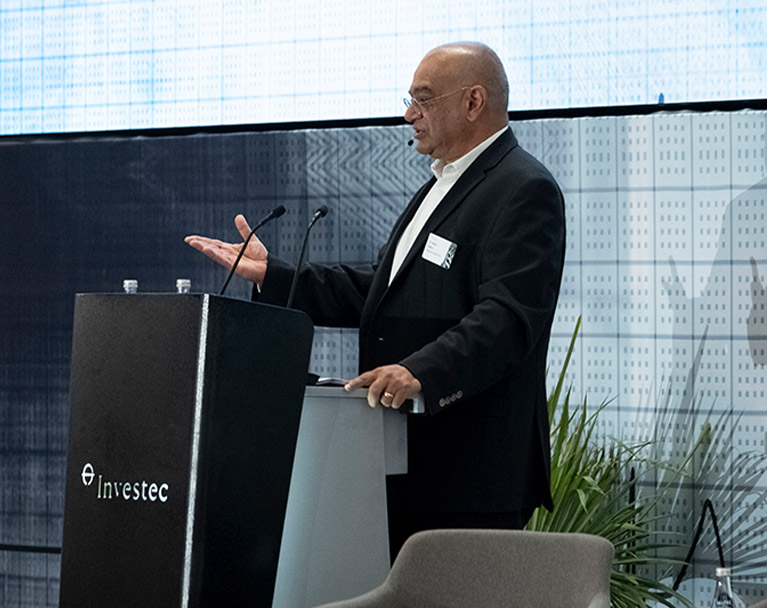While geological epochs might not, on the face of it, have much to do with South Africa’s deep health challenges, an understanding of the topic can help us to get to the heart of tackling the crisis.
Dr Aslam Dasoo of the Progressive Health Forum, an organisation founded on the principle of ensuring access to healthcare for all, used the device of geological epochs to highlight the environmental, political and economic causes behind South Africa’s failure to deliver universal basic healthcare to all of its citizens.
Speaking at Investec’s recent HealthBeat Conference, Dasoo spoke about the idea of an “Anthropocene” epoch, an unofficial epoch that describes the most recent period in Earth’s history in which human activity has started to have a major impact on the planet’s climate, ecosystems and even its geology.
Watch the summary here
The Four Horsemen of the Anthropocene
Dasoo used the analogy of what he called The Four Horsemen of the Anthropocene, all of which have contributed to creating the healthcare challenges South Africa faces today:
- The first is global climate change;
- the second is the crisis in modern economic organisation that has led to rising inequality;
- the third is the growing inability of states to securely distribute public goods and services in a way that enables growth, stability and economic freedom;
- while the fourth is the increased likelihood of global pandemics, themselves largely the result of the disruption of the natural world and the decline in biodiversity.
Dasoo argued that all four of these have a bearing on our lives in ways that impact health. “The maintenance of good human health is not determined by health systems, but by social and economic organisation,” he argued. “So, health is a function of access to sufficient nutrition, to adequate shelter, to potable water, and sanitation, to basic education, to personal and communal safety, to economic opportunity, and to social protection and recreation.”
Healthcare systems on the other hand, “are designed to meet any deterioration of health occasioned by the breakdown of the non-deliverability of the social and economic determinants of health,” he added. This meant that economic and population disparities must result in differently resourced healthcare systems.
Socio-economic factors therefore were the main determinants of life expectancy and other key measures of human wellbeing. Dasoo pointed to the fact that food insecurity in many parts of the country meant that a quarter of all South Africans at the age of five show measurable signs of stunting, leading to smaller stature in adulthood, lower cognitive capacity, poorer economic achievement, poorer health and shorter lifespans.
Listen to podcast: Bridging the gap - SA’s healthcare conundrum
South Africa’s ailing healthcare system has significant implications for the population and the economy. What needs to be done to change the course of healthcare in SA? In the latest episode of the No Ordinary Wednesday podcast, health activist Dr Aslam Dasoo and Investec Healthcare Equity Analyst Letlotlo Lenake discuss the NHI and the future of healthcare in SA.
The Apartheid healthcare system
Dasoo pointed to the role of public health services rolled out in many developed and developing countries since the 1940s, in helping to tackle these and other social challenges, and South Africa was no exception.
“Despite apartheid's awful dismemberment of the country into the homeland system, it contrived by the 1980s, more by political mendacity than by design, to create the most widely distributed healthcare delivery system per capita on the continent and in much of the southern hemisphere, even as its resources and quality of facilities were differentiated,” he said.
“While the number of black physicians and other health professionals were disproportionately small in number, the state had to train them to the same level of skill and expertise as everyone else, even while forcing them to practice in this racialised matrix.”

All healthcare is local. It all comes down to the patient. It all comes down to the interaction between the healthcare provider and the healthcare seeker.
Centrist approach to healthcare
After apartheid, the Mandela administration embarked on the development of the primary healthcare system to undergird the rest of this public health service, Dasoo explained. He pointed out that a thousand primary healthcare centres were built.
Unfortunately, the government balked at the idea of introducing a devolved system, instead following a centrist approach built around the provincial governments.
“Over the last 20 years they have not only reversed the gains of those early years, but by the excesses of mismanagement and its appalling corruption, they have contrived to cause profound and often irreversible damage to the public healthcare service, denuding it of much of the excellence of South Africa's health professionals and robbing the populace of its constitutionally entitled access,” he added.
Meanwhile, access has been reduced, not increased, with 90% of South Africans still dependent on the public health service, where the “sheer neglect and legendary mismanagement has over the last two decades driven disillusioned, highly skilled health professionals out of the public service”.
Criminal neglect of public health service
The idea of National Health Insurance was no solution to the problem, argued Dasoo. He argued that the workable National Health Policy of 1997 was abandoned, to be replaced by the commitment to the current framework.
“Government has spent billions over these years on consultants and research on ways to make it work with its latest iteration showing little advance on its obvious unsuitability,” he added.
“Meanwhile, the benign, and some would say criminal, neglect of the public health service in the years that followed has resulted in a fractured and inchoate potpourri of different provincial standards of care and its management.”
Public-private partnerships crucial for change
And what about the future? Dasoo argued that a new politics needs to manifest itself, one that allows individuals and institutions to openly engage with government on the best way forward. This included giving the private sector a voice, he added:
“Where there is an acceptance by the government that an industry invested in the well-being of people, like the private health sector, that demonstrates a commitment to the development and progress and prosperity of South Africa, then [there should be] a corresponding commitment from government, one that will appreciate that forthrightness from an industry that it must demonstrably trust as a patriotic national asset and a true partner, and whose attributes and expertise give South Africa a competitive advantage in the world.”
But this also required a reconfiguration of the state, which has been shown to be lacking up to now. “The wealthy (or capital) must make direct common cause with the workers and the poor and insist that neither of them need the leadership of the government, which should subordinate its very existence to the enablement of this common cause. This is the formula used by successful social democracies, and South Africa deserves no less,” he concluded.
Dasoo echoed the saying that all politics is local, and that health policy should reflect this: “All healthcare is local. It all comes down to the patient. It all comes down to the interaction between the healthcare provider and the healthcare seeker.”
Watch the full speech here
You may also be interested in

Investec for Corporates
We are inspired by our clients and their potential. We combine our specialist skills, industry knowledge and willingness to get to know your business, to support the growth of your business, through a complete portfolio of corporate and investment banking products and services.



